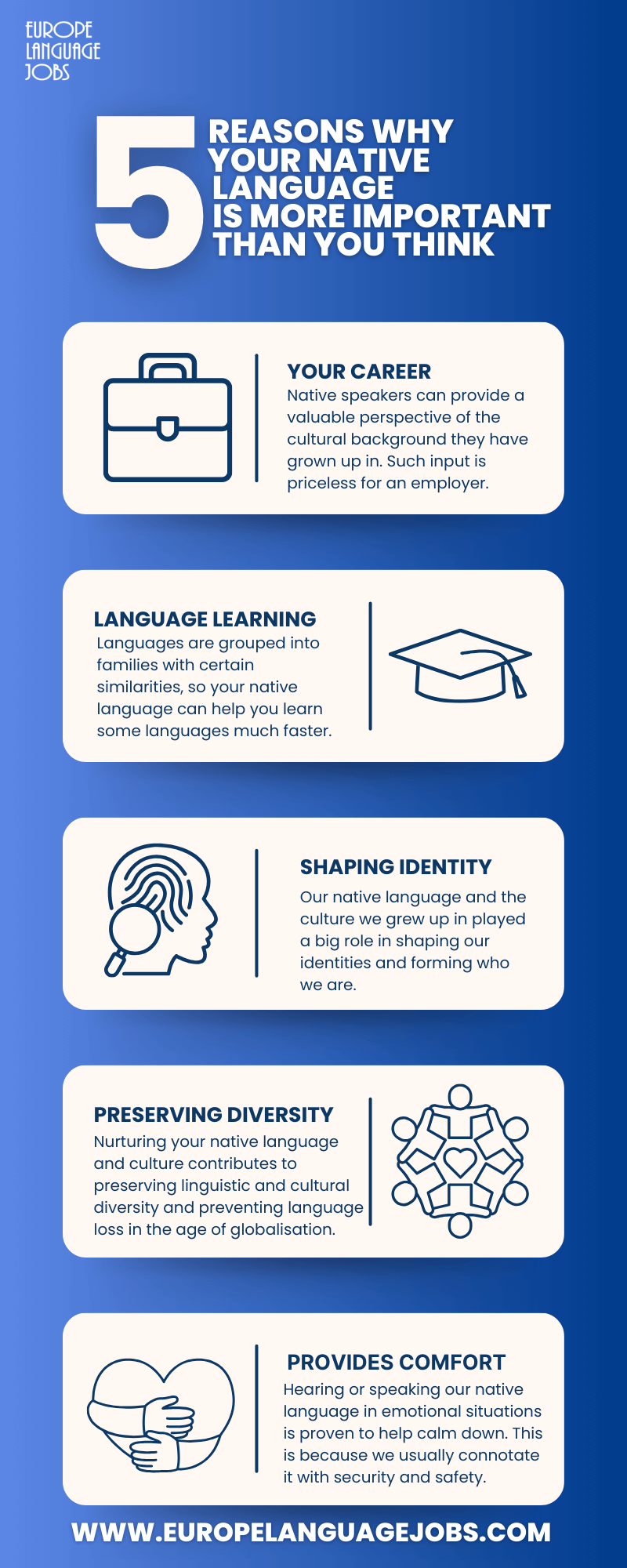Our native language is something that has accompanied us since our first breath. It witnessed us grow, learn to walk, learn to talk, form opinions, and stand up for them. It has been with us during our first day of school, our first heartbreak, and through every single success and failure.
No wonder then that most of the time, we take our native languages for granted.
This International Mother Language Day, we want to celebrate mother tongues in a way they deserve. In this article, we will show you why your native language is more important than you think.

5 Reasons Why Your Native Language is More Important Than You Think

For you, speaking your mother tongue is obvious. But did you know dozens of employers out there compete for native speakers just like you?
Nobody knows how valuable native languages are in the job market than a job board specialising in advertising language-based offers. At Europe Language Jobs, we help top international companies find speakers of various languages. So, we know exactly just how difficult it can be sometimes!
Yes, it is true that Dutch, German, or the Nordic languages are the most in-demand in the job market right now. But go on our website and see just how many jobs there are for speakers of other languages: Spanish, Italian, Polish, Czech, Portuguese - you name it!
You can learn other hard skills necessary for the job relatively quickly. However, learning a language at a native or near-native level, which is usually required in the professional world, takes time. Additionally, only a native speaker can provide a valuable perspective of the cultural background they have grown up in. Such input is priceless for an employer.

Have you ever wondered how long it takes to learn a new language? Well, we don’t have the time for the long answer here. But the short answer is that it really depends on your native language!
Languages are grouped into families. For example, English and German belong to one family, and French and Spanish to another. Languages within one family have certain similarities between them because they have developed from the same root.
Therefore, if your native language is French, you might find it easier to learn Spanish than German due to the similarities between languages.
Of course, that isn’t to say that you should only learn languages related to your mother tongue. The speed and effectiveness of language acquisition is much more complex and depends on many other factors. But your native language can definitely help you in that as well.

Our native language is an inherent part of who we are. It impacts how we think, how we express ourselves and communicate with other people.
What’s more, languages don’t exist in a vacuum. They are tied to cultures, which play an important role in shaping who we are.
Nowadays, many people grow up surrounded by multiple languages and multiple cultures. Sometimes, it is even impossible to separate just one language or culture that we would call native. Identities are shaped by diverse factors, and there is beauty in it.
But no matter how many languages and/or cultures you consider native, there is no denying that they all constitute a large part of you. We constantly evolve and rediscover ourselves our whole lives, but it is very difficult to scrape the elements you grew up surrounded with.
Your native languages and cultures are the first things you grow up knowing. Because of that, a kernel of them will always remain inside of you, form a part of who you are. Regardless of how you feel about your origins, treasure those parts, because they are what makes you you, from your very first days.

Your language and cultural background is unique. It is like a fingerprint - there are no two people with exactly the same backgrounds.
It is extremely important to remember that in the age of globalisation. Sure, the spread of dominant languages such as English, Chinese or Spanish has its benefits. The goal of appointing primary languages for global communication is to facilitate interactions.
But every coin has two sides. Facilitated communication sometimes comes at the cost of losing other precious languages. We don’t have the time or the mental capacity to learn all the most useful languages and nurture the minority language of our immediate surroundings.
According to the newest findings, a language is said to die every three months. The issue of language extinction usually concerns native languages most of us were never aware of. But behind every dying language, there are people who spoke it, who grew up shaped by it and nurtured it, elements of culture we will never retrieve, and centuries of history that will be forgotten.
Protecting the diversity of our native languages means protecting our identity and heritage. We live in a world which prioritises the learning of modern languages over the preservation of the languages of minorities, but it is our duty as native language speakers to look after our mother tongues.

Have you ever travelled to a place where you didn’t know the language and felt insecure or even alienated? In such situations, we often find ourselves wishing someone spoke our native language.
Perhaps you have also heard that speaking their mother tongue to someone who is disoriented or confused can help them focus. Or that if your friend has a bit too much to drink, you should talk to them in their native language to help them sober up.
This is because our native language brings us comfort. We usually connect it with home and safety, and use it like a security blanket in difficult situations.
Even if you are multilingual, there is probably one language that dominates your thoughts whenever your emotions take over. A language in which swearing feels more impactful and saying I love you has more meaning.
Your mother tongue is the only constant in your life. The only thing that will be with you always, no matter where you go or what you do. It will never abandon you, and so you should never turn your back on it, either.
What is the International Mother Language Day?
International Mother Language Day falls on the 21st of February. It was announced in 1999 by UNESCO and adopted by the UN General Assembly in 2007. The holiday aims to promote the importance of linguistic and cultural diversity and promote multilingualism - two goals we fully support here at Europe Language Jobs.
We are all aware that Valentine’s Day falls on the 14th of February. But fewer people know that a much more exciting holiday occurs just a week later. Various events take place globally, bringing together speakers of various languages and people from different cultures.
International Women’s Day celebrates the achievements of women. International Mother’s Day celebrates all mothers.
And International Mother Language Day celebrates native languages all over the world.
Our native languages are one of the few things in life we get for free. However, we often fail to appreciate their value. And for something we never had to pay for, they do come with a lot of benefits!
Our mother tongues are our biggest strength in the job market, help us learn other languages faster, and shape our identity. Speaking them allows us to protect global diversity and brings us comfort in challenging situations.
It is time we started giving our native languages the respect they deserve - not only on International Mother Language Day, but every day of every year.
Feeling inspired? Visit our blog for more career advice! How can you be sure the information we provide is top-notch? We are a group of professionals working with recruiters, career coaches, and HR specialists from all over the world!
Trust our experience and let us help you find a new job in Europe!





